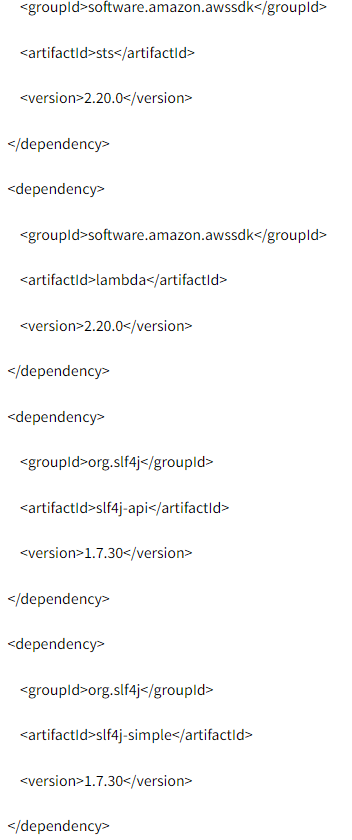How can AWS STS get-caller-identity help troubleshoot failing Lambda functions?
am a Cloud engineer and I am currently working for a company that uses AWS for its infrastructure. Recently, there has been an issue where some AWS lambda functions are failing due to the lack of the necessary permission to access certain AWS resources. To identify the called Identity of these lambda functions, I decide to use the AWS sts get-caller-identity API call. Describe to me how can I implement this solution.
In the context of AWS, here are the steps given:-
Set up the AWS SDK
You should try to ensure that the AWS SDK for Python is installed. In the lambda environment, the Boto3 should be pre-installed. Here is the example given:-

Write the lambda function for calling get caller identity
Now you can write the lambda function for the purpose of calling the get caller identity by using the boto 3 and then log the identity details. Here is the example given below:-
Package com.example;
Import software.amazon.awssdk.auth.credentials.ProfileCredentialsProvider;
Import software.amazon.awssdk.services.sts.StsClient;
Import software.amazon.awssdk.services.sts.model.GetCallerIdentityRequest;
Import software.amazon.awssdk.services.sts.model.GetCallerIdentityResponse;
Import org.slf4j.Logger;Import org.slf4j.LoggerFactory;Public class LambdaHandler {
Private static final Logger logger = LoggerFactory.getLogger(LambdaHandler.class);
Public static void main(String[] args) {
lambdaHandler();
} Public static void lambdaHandler() {
// Create an STS client
StsClient stsClient = StsClient.builder()
.credentialsProvider(ProfileCredentialsProvider.create())
.build();
Try {
// Create a GetCallerIdentity request
GetCallerIdentityRequest getCallerIdentityRequest = GetCallerIdentityRequest.builder().build();
// Call GetCallerIdentity
GetCallerIdentityResponse response = stsClient.getCallerIdentity(getCallerIdentityRequest);
// Extract relevant information
String userId = response.userId();
String account = response.account();
String arn = response.arn();
// Log the caller identity information
Logger.info(“UserId: {}, Account: {}, Arn: {}”, userId, account, arn);
} catch (Exception e) {
Logger.error(“Error calling GetCallerIdentity”, e);
} finally {
// Close the STS client
stsClient.close();
}
}
}Handling the response
The response object from “getcalleridentity” contains the user id, account and arn. These fields can be used for the purpose of logging and troubleshooting.
Package com.example;
Import com.amazonaws.services.lambda.runtime.Context;
Import com.amazonaws.services.lambda.runtime.RequestHandler;
Import com.amazonaws.services.lambda.runtime.events.SQSEvent;
Import software.amazon.awssdk.auth.credentials.DefaultCredentialsProvider;
Import software.amazon.awssdk.services.sts.StsClient;
Import software.amazon.awssdk.services.sts.model.GetCallerIdentityRequest;
Import software.amazon.awssdk.services.sts.model.GetCallerIdentityResponse;
Import software.amazon.awssdk.services.sts.model.StsException;
Import org.slf4j.Logger;
Import org.slf4j.LoggerFactory;Public class LambdaHandler implements RequestHandler {
Private static final Logger logger = LoggerFactory.getLogger(LambdaHandler.class);
@Override
Public String handleRequest(SQSEvent event, Context context) {
// Initialize the STS client
StsClient stsClient = StsClient.builder()
.credentialsProvider(DefaultCredentialsProvider.create())
.build(); Try {
// Create a GetCallerIdentity request
GetCallerIdentityRequest getCallerIdentityRequest = GetCallerIdentityRequest.builder().build();
// Call GetCallerIdentity
GetCallerIdentityResponse response = stsClient.getCallerIdentity(getCallerIdentityRequest);
// Extract relevant information
String userId = response.userId();
String account = response.account();
String arn = response.arn();
// Log the caller identity information
Logger.info(“UserId: {}, Account: {}, Arn: {}”, userId, account, arn);
// Return the response details as a string
Return String.format(“Caller Identity – UserId: %s, Account: %s, Arn: %s”, userId, account, arn);
} catch (StsException e) {
Logger.error(“Error calling GetCallerIdentity”, e);
Return “Error fetching caller identity: “ + e.getMessage();
} finally {
// Close the STS client
stsClient.close();
}
}
}
